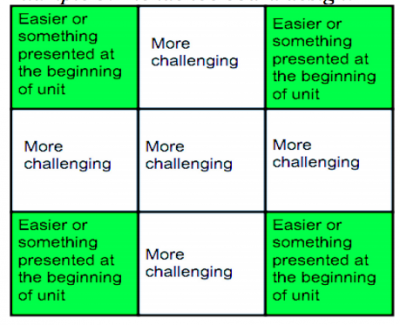Your Choice,My Choice/alx
| Your Choice,My Choice | |
| Contributors | Joseph Bergin, Christian Kohls, Christian Köppe, Yishay Mor, Michel Portier, Till Schümmer, Steven Warburton |
|---|---|
| Last modification | June 6, 2017 |
| Source | Bergin et al. (in press 2015)[1]; Bergin et al. (2016)[2] |
| Pattern formats | OPR Alexandrian |
| Usability | |
| Learning domain | |
| Stakeholders | |
Provide assessment options students can choose from in order to cover all elements of a course.
You are designing the assessment structure for your course and want students to engage in Active Learning and want to use some variation on the Student Selected Activities and Students Decide Pedagogical Patterns.
***
Learners demonstrate greater investment and responsibility in an activity when they have a choice.
Students seek out the low-hanging fruits but all elements of a curriculum need to be covered. Sometimes students have specific skills but the instructor-chosen assessment is not adequate for a that type of learner.
When offered a choice of assessment tasks learners will often be strategic and select what they perceive as the easiest set to complete.
***
Therefore create a menu of assessments that are designed to cover all of the required elements and add simple rules to how the learner can choose the tasks they wish to tackle in such a way that they will always have a balanced diet. Take care that not all choices are too easy or too difficult.
Think of a Restaurant menu or a Tic tac toe matrix where students can choose items from. The combination of elements cumulates to a sum (each activity is associated with a points score and the student needs to choose a set that adds to a predefined total).
This pattern is also visible in the way we set exams and other summative tests. We offer (limited) choice in the question set.
This is a solution that draws on the idea of differentiated instruction: “A flexible approach to teaching in which the teacher plans and carries out varied approaches to content, process, and product in anticipation of and in response to student differences in readiness, interests, and learning needs” (Carol Ann Tomlinson)
You may expect: The requirements can allow students to experience different activity forms. The student activities are reusable and tailorable. Students may feel more empowered when they are involved in the choices.
However: It is more work to design alternative assessments: you need to come up with more ideas and search for more examples. To have assessments that capture the same elements in different ways is difficult.
Examples
Example 1: A dinner menu for ‘photosynthesis’
Appetizer (Everyone Shares)
- Write the chemical equation for photosynthesis.
Entrée (Select One)
- Draw a picture that shows what happens during photosynthesis.
- Write two paragraphs about what happens during photosynthesis.
- Create a rap, poem, or song that explains what happens during photosynthesis.
Side Dishes (Select at Least Two)
- Define respiration, in writing.
- Compare photosynthesis to respiration using a Venn Diagram.
- Write a journal entry from the point of view of a green plant.
- With a partner, create and perform a skit that shows the differences between photosynthesis and respiration.
Dessert (Optional)
- Create a test to assess the teacher’s (or a fellow student’s) knowledge of photosynthesis.
Example 2: Straight alternatives:
A student could, for example, choose to two somewhat simpler projects or a single harder one. One option might provide more depth, the other more breadth.
Example 3: Tic tac toe board design:[3]
Related Patterns
References
- ↑ First mentioned in Bergin, J., Kohls, C., Köppe, C., Mor, Y., Portier, M., Schümmer, T., Warburton, S. (in press 2015). Assessment-Driven Course Design - Fair Play Patterns. In Proceedings of the 22nd Conference on Pattern Languages of Programs (PLoP 2015). New York:ACM
- ↑ Bergin, J., Kohls, C., Köppe, C., Mor, Y., Portier, M., Schümmer, T., & Warburton, S. (2016). Student's choice of assessment. In Proceedings of the 21st European Conference on Pattern Languages of Programs (EuroPLoP 2016)(p. 22). New York:ACM.
- ↑ See https://daretodifferentiate.wikispaces.com/Choice+Boards for a range of resources to provide inspiration.
